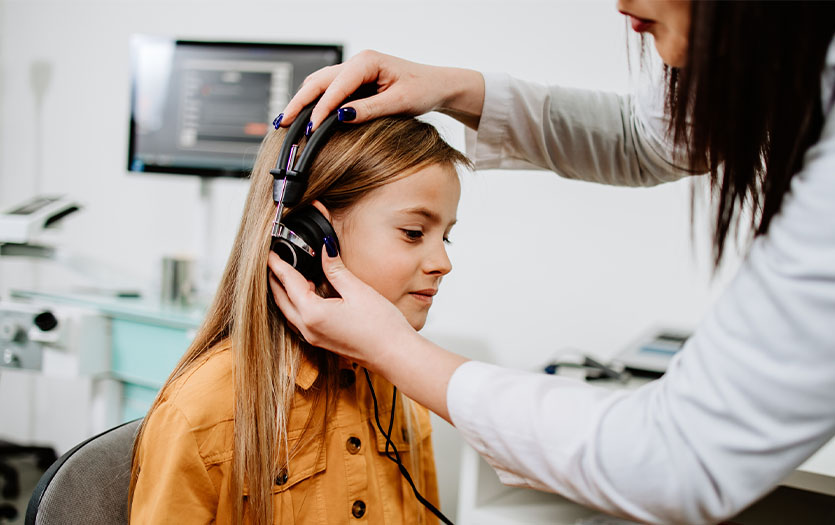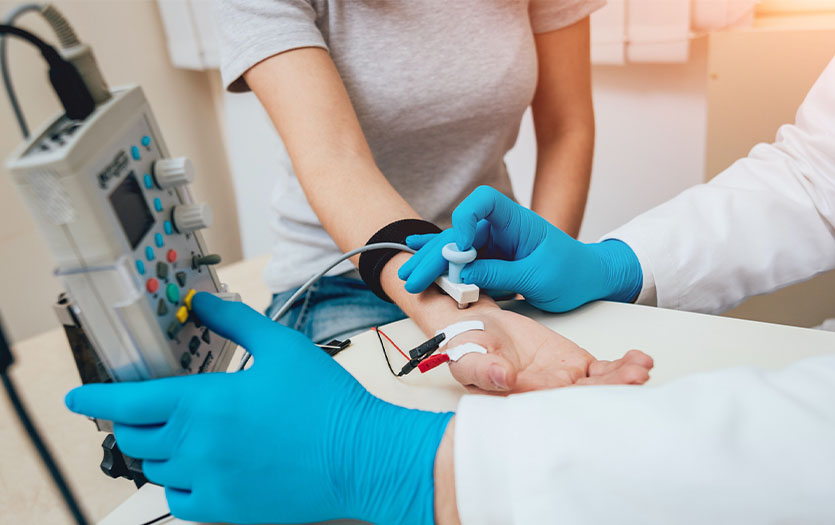
When a baby enters the world, a trusted team of caregivers diligently assesses their health so that any issues can be addressed promptly. Part of this initial newborn screening is a hearing test. This could take place in the hospital or at baby’s first check-up. While The American Academy of Pediatrics (AAP) recommends objective hearing testing for all newborns, some states require it. This is then followed by routine follow-ups as the child develops. Learn more about the cadence and signs that your little one might be struggling.
How often should my child’s hearing be checked?
Experts recommend that all newborns be screened for hearing loss. Since problems can arise later, The AAP recommends objective hearing testing for children at ages 4, 5, 6, 8 and 10 as well. Many providers will include this as part of the annual well-child exam. It’s also important to bring any concerns to your pediatrician’s attention at any point if you notice your child having difficulty hearing.
Why is it so important to get my child’s hearing tested?
Some hearing problems can delay your child's speech and language development. Early screening for hearing loss can help prevent many learning, social and emotional challenges related to speech and language.
What’s involved in a hearing test?
In most screenings, your child responds to how well they hear a series of tones or words (subjective testing). Hearing is also tested by examining your child's ears or by using an instrument to measure how the ears react to sound (objective testing). In objective testing, your child is not asked to respond to sounds.
How can I identify hearing problems in my child?
During well-child visits, your doctor checks your baby's growth and development to see if your baby is reaching the milestones for each age. Between visits, you can also watch for these signs of normal hearing development. If you are concerned that your child is not reaching these milestones, talk with your doctor about testing your child for hearing problems.
Newborn to age 3 months
Does your baby:
- Listen to speech?
- Turn to you when you speak?
- Smile when spoken to?
- Seem to recognize your voice?
- Quiet their crying when you speak?
- Startle or cry at noises?
- Awaken to loud sounds?
Ages 4 to 6 months
Does your baby:
- Respond to changes in your voice?
- Look around for the source of sounds?
- Notice toys that make sound?
Ages 7 months to 1 year
Does your baby:
- Listen when spoken to?
- Turn or look up when you call their name?
- Respond to requests like "come here" or "want more?"
- Recognize words for common items like cup, shoe or juice?
Ages 1 to 2 years
Pay attention to the quality of your child's speech. Children must be able to hear well for normal speech and language to develop. Also, keep watching your child's behavior for signs of struggle.
Does your child:
- Listen to simple stories, songs or rhymes?
- Follow simple commands and understand simple questions, such as "roll the ball," "kiss the baby" or "where is your shoe?"
- Point to a few body parts when asked?
- Point to pictures in a book when they are named?
Ages 2 to 4 years
Keep paying attention to the quality of your child's speech and their behavior.
Does your child:
- Follow two requests, such as "Get the ball and put it on the table?"
- Continue to notice sounds, such as a telephone ringing, television sounds or knocking at the door?
Ages 4 and older
By age 4, your child may tell you they are having trouble hearing or understanding others. You can ask your child questions about their hearing.
Also, does your child:
- Follow complicated instructions, such as "Take your coat to your bedroom and bring a book to read"?
- Respond to sounds appropriately, such as a telephone ringing, television sounds or knocking at the door?
Your child's teacher may notice behavior that would mean your child is not hearing well, such as talking in a loud voice or not following instructions.
How can I prepare for my child's hearing test?
- Try to have your child avoid loud noises for 12 to 16 hours before these tests.
- Tell the doctor if your child takes or has taken antibiotics that can damage hearing, such as gentamicin.
What is an abnormal hearing test result for a child?
An abnormal hearing test may show problems with nerves involved in hearing, or that your child hears in one ear better than in the other. Sometimes it shows that your child hears sounds but cannot hear them as words.
An abnormal result doesn't always mean that your child will have lasting hearing problems. Some types of hearing loss get better on their own and others can be treated.
What happens after my child has an abnormal hearing test?
- If your child's hearing loss is caused by a problem that can be treated, ask your doctor about the best treatment.
- If your child's hearing loss is permanent, talk to your doctor about hearing aids and cochlear implants. A cochlear implant is a small electronic device that can help "make" sound.
- Schedule follow-up hearing tests and doctor visits so you can track your child's hearing.
- Talk to your child's teachers about your child's hearing. Tell them what they can do to help. Some hearing problems can delay your child's speech and language development.
- Call your doctor if you think your child's hearing loss is getting worse.
Getting help for hearing loss
Contact your primary care provider if you feel your child is experiencing hearing problems.
If you or a loved one is experiencing symptoms of hearing loss, such as muffled hearing or difficulty understanding what people are saying, the audiology team at PPG – Ohio, can help. Our staff specializes in the latest treatment options for hearing loss, and we offer personalized management and treatment options for the hearing impaired. Call 419-636-4517 to make an appointment.
Copyrighted material adapted with permission from Healthwise, Incorporated. This information does not replace the advice of a doctor.



